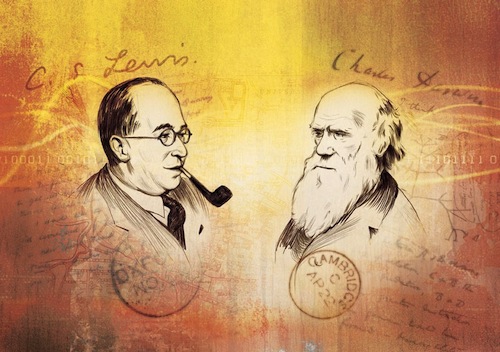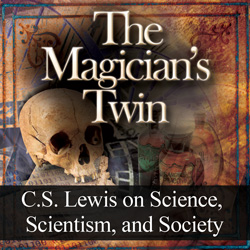 Evolution
Evolution
 Faith & Science
Faith & Science
Darwin in the Dock: C.S. Lewis’s Critique of Evolution and Evolutionism

Editor’s Note: With the approach on Friday, November 22, of the 50th anniversary of C.S. Lewis’s passing, we present this week in four installments “Darwin in the Dock,” an important chapter from CSC associate director John West’s book The Magician’s Twin: C.S. Lewis on Science, Scientism, and Society. What follows is Part 1.

In the sultry summer of 1925, a battle royal raged in Dayton, Tennessee as political titans Clarence Darrow and William Jennings Bryan clashed in the trial of high school teacher John T. Scopes, an event immortalized — albeit inaccurately — in the play and film Inherit the Wind.1 The scopes trial cast a long shadow. Even today it continues to be used to caricature anyone skeptical of Darwin’s theory of evolution as an unsophisticated dunce.
Few people would ever accuse C.S. Lewis of being either unsophisticated or a dunce. Yet during the summer of the Scopes trial in America, a twenty-something C.S. Lewis in England was expressing his own doubts about Darwin. A veteran of the front lines of World War I, Lewis had just been elected a Fellow of Magdalen College at Oxford. Previously a tutor in philosophy, he assumed a new position in English literature.2
A few weeks after the Scopes trial concluded, Lewis wrote to his father about his change in academic fields. He commented that although he was glad of the change, he was grateful for “something of value” that he learned from philosophy: “It will be a comfort to me all my life to know that the scientist and the materialist have not the last word: that Darwin and Spencer undermining ancestral beliefs stand themselves on a foundation of sand; of gigantic assumptions and irreconcilable contradictions an inch below the surface.”3 Still an atheist, Lewis already had gnawing doubts about Darwinism.
Lewis’s early skepticism of Darwinism makes it all the more astonishing that he has been honored as a veritable patron saint in recent years by some contemporary proponents of theistic evolution. In the bestselling book The Language of God (2006), for example, biologist Francis Collins highlighted the role Lewis’s writings played in his own conversion to Christianity as well as invoking Lewis to defend the idea that Christians should accept the animal ancestry of humans.4 In a 2010 article in the journal Perspectives on Science and Christian Faith, philosopher Michael Peterson of Asbury University went considerably further. According to Peterson, Lewis not only embraced “both cosmic and biological evolution as highly confirmed scientific theories,” but he would have rejected out-of-hand arguments offered by modern proponents of intelligent design.5 In 2011, Peterson’s article on Lewis and evolution was serialized online by the pro-theistic-evolution group BioLogos.6
On one level, appeals to Lewis by proponents of theistic evolution are easy to understand. Despite more than a century of boosterism by Darwin’s defenders, many traditional Christians remain deeply skeptical of efforts to mix God and Darwinian evolution. Indeed, according to a nationwide survey of Protestant clergy released in 2012, an overwhelming 72 percent disagreed with the position that “God used evolution to create people.”7
The skepticism of theistic evolution by many Christians is fueled by leading theistic evolutionists who challenge Biblical authority, dismiss the historicity of the Fall, and even deny that God specifically directs the evolutionary process. According to Biblical studies professor Kenton Sparks (writing for the BioLogos website), “If Jesus as a finite human being erred from time to time, there is no reason at all to suppose that Moses, Paul, John wrote scripture without error.”8 According to Karl Giberson (a co-founder of BioLogos with Francis Collins), human beings were selfish and sinful from the very start, so there was no actual “Fall.”9 And according to biologist Kenneth Miller, author of Finding Darwin’s God (a seminal text for modern American theistic evolutionists), God himself did not know whether the “undirected” process of evolution would produce human beings or something radically different, say, “a mollusk with exceptional mental capabilities.”10
In contrast to such heterodoxy, C.S. Lewis is a beloved icon of mainstream, historic Christianity. He provides a “Good Housekeeping” seal of approval for many Christians. If Lewis can be enlisted as a supporter of theistic evolution and a critic of intelligent design, perhaps theistic evolution will be able to broaden its base of support among traditional Christians.
There is little doubt that Lewis was interested in the topic of evolution. He discussed it repeatedly in his books and essays, although circumspectly. He wrote about it in his private letters. And his personal library contained more than a dozen books and pamphlets focused on evolution, some of which were marked up with extensive underlining and annotations, including his personal copy of Charles Darwin’s Autobiography.11
Although Lewis was interested in evolution, he also understood its cultural dominance, which helps explain his cageyness in publicly communicating about the topic. He observed to one correspondent that “Evolution etc” is the “assumed background” of modern thought.12 He declined to write a preface to an anti-evolution book by someone else because he feared the repercussions for his public role as a Christian apologist: “Many who have been or are being moved towards Christianity by my books wd. be deterred by finding that I was connected with anti-Darwinism.”13
If Lewis was cautious about how much he criticized Darwinian evolution in public, he was equally careful to distance himself from evolution’s uncritical boosters. Michael Peterson quotes Lewis in Mere Christianity as flatly affirming that “Everyone now knows… that man has evolved from lower types of life,” as if Lewis thought no reasonable person could disagree.14 But this is a case of putting words in Lewis’s mouth through creative editing.
Here is the unedited version of what Lewis actually wrote in Mere Christianity with the words Peterson deleted in bold: “Everyone now knows about Evolution (though, of course, some educated people disbelieve it): everyone has been told that man has evolved from lower types of life.”15 Reading the sentence in its entirety, one can see that far from asserting that “evolution” is something that “everyone now knows,” Lewis was merely stating that “everyone now knows about evolution,” and “everyone has been told” certain things about it. This was a description of popular sentiment, not a statement about whether evolution is true or false. Lest someone misunderstand Lewis as endorsing the idea that no reasonable person can doubt evolution, Lewis added the caveat, “of course, some educated people disbelieve it.”
Lewis’s reservations about evolution in this passage were quite intentional, as they were inserted by him after the original radio talk that formed the basis of this section of Mere Christianity.16 Nevertheless, Lewis’s overall point in this passage had nothing to do with biological evolution at all. He invoked evolution as an analogy to help people better understand the Christian doctrine of sanctification. He cited evolution because he thought it was an illustration “a modern man can understand.” So what were Lewis’s real views about evolution? To answer that question fairly, we first need to untangle the distinct ways in which Lewis employed the term.
One of the most challenging things about discussing “evolution” today is that the term is so elastic, covering everything from mere “change over time” to the development of all living things from one-celled organisms to man through an unguided process of natural selection acting on random variations. Evolution has so many different meanings, in fact, that if one doesn’t pay close attention, a conversation on the topic will quickly devolve into people talking past one another.17
Lewis addressed at least three different kinds of evolution in his writings: (1) evolution as a theory of common descent; (2) evolution as a theory of unguided natural selection acting on random variations (a.k.a. Darwinism); and (3) evolution as a cosmic philosophy (a.k.a. “evolutionism”).
As we shall see, Lewis did not object in principle to evolution in the first sense (common descent), although he sharply limited its application in a way that mainstream proponents of evolution would find unacceptable. The case for Lewis as a supporter of evolution in the second sense (Darwinism) is almost non-existent. Lewis was a thoroughgoing skeptic of the creative power of unguided natural selection. As for evolution in the third sense — evolutionism — Lewis respected the poetry and grandeur of what he sometimes called the “myth” of evolution, but he certainly regarded it as untrue.
Endnotes:
- For good accounts of the real story of the Scopes trial and the inaccuracies of Inherit the Wind, see Larson, Summer for the Gods (New York: Basic Books, 1997); Carol Iannone, “The Truth about Inherit the Wind,” First Things, February 1997, accessed May 18,
2012, http://www.firstthings.com/article.php3?id_article=3645; Marvin Olasky and John Perry, Monkey Business: The True Story of the Scopes Trial (Nashville: Broadman and Holman, 2005). - See George Sayer, Jack: A Life of C. S. Lewis (Wheaton, IL: Crossway, 1994), 176-184; Roger Lancelyn Green and Walter Hooper, C.S. Lewis: A Biography, rev. edition (San Diego: Harcourt Brace & Company, 1994), 79-85.
- C.S. Lewis to his Father, Aug. 14, 1925 in C.S. Lewis: Collected Letters, edited by Walter Hooper (London: HarperCollins, 2000), vol. I, 649.
- Francis Collins, The Language of God (New York: Free Press, 2006), 21-31, 208-209, 222-225.
- Michael L. Peterson, “C.S. Lewis on Evolution and Intelligent Design,” Perspectives on Science and Christian Faith 62, no. 4 (December 2010): 253-266.
- Michael L. Peterson, “C.S. Lewis on Evolution and Intelligent Design,” www.biologos.org (April 2011), accessed May 18, 2012, http://biologos.org/uploads/projects/peter- son_scholarly_essay.pdf.
- David Roach, “Poll: Pastors Oppose Evolution, Split on Earth’s Age,” www.lifeway.com, Jan. 9, 2012, accessed May 18, 2012, http://www.lifeway.com/Article/research-Poll- Pastors-oppose-evolution-split-on-earths-age.
- Kenton Sparks, “After Inerrancy: Evangelicals and the Bible in a Postmodern Age,” BioLogos Forum, June 2010, accessed May 18, 2012, http://biologos.org/uploads/ static-content/sparks_scholarly_essay.pdf.
- Karl Giberson, Saving Darwin (New York: Harperone, 2008), 11-13.
- Miller quoted in John G. West, Darwin Day in America: How Our Politics and Culture Have Been Dehumanized in the Name of Science (Wilmington, DE: ISI Books, 2007), 226; more generally, see discussion on 225-227; also see Kenneth Miller, Finding Darwin’s God (New York: HarperCollins, 1999).
- Some of these books and pamphlets with a significant focus on evolution in Lewis’s library include Bernard Acworth, The Cuckoo; Alfred Balfour, Theism and Humanism; Henri Bergson, L’Evolution Creatrice; Charles Darwin, Autobiography; L.M. Davies, BBC Abuses Its Monopoly; L.M. Davies, Evolutionists Under Fire; Douglas Dewar, The Man from Monkey Myth; Douglas Dewar, Science and the BBC; Evolution Protest Movement, Evolution: How the Doctrine Is Propagated in Our Schools; C.W. Formby, The Unveiling of the Fall; E.O. James, Evolution and the Fall; Edmund Sinnott, Biology of the Spirit; Joseph Solomon, Bergson; Pierre Teilhard de Chardin, The Phenomenon of Man. Much of Lewis’s personal library is currently housed at the Wade Center, Wheaton College. For a listing of the extant books from Lewis’s personal library, consult the description in “C.S. Lewis Library” (Wade Center, 2010), accessed May 18, 2012, http://www.wheaton.edu/wadecenter/Collections-and-services/Collection%20List- ings/~/media/Files/Centers-and-institutes/Wade-Center/rr-docs/non-archive%20
Listings/Lewis_Public_shelf.pdf. - C.S. Lewis to Dom Bede Griffiths, July 5, 1949, The Collected Letters of C.S. Lewis San Francisco: HarperSanFrancisco, 2004), vol. II, 953.
- C.S. Lewis to Bernard Acworth, Oct. 4, 1951, in The Collected Letters of C. S. Lewis, edited by Walter Hooper (San Francisco: HarperSanFrancisco, 2007), vol. III, 140.
- Peterson, “C.S. Lewis on Evolution and Intelligent Design” (2010), 264.
- C.S. Lewis, Mere Christianity (New York: Macmillan, 1960), 154.
- A written transcript of the radio talk that formed the basis of this part of Mere Christianity can be found at “C.S. Lewis — Only Surviving Episode of Broadcast Talks,” accessed May 19, 2012, http://www.awesomestories.com/assets/cs-lewis-only-surviving-episode-of-broadcast-talks. The website also has the original audio for this broadcast talk by Lewis.
- On the different meanings of evolution, see the helpful discussion by Jay Richards, editor, God and Evolution: Protestants, Catholics, and Jews Explore Darwin’s Challenge to Faith (Seattle: Discovery Institute Press, 2010), 18-25.
